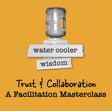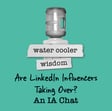Become a Creator today!Start creating today - Share your story with the world!
Start for free
00:00:00
00:00:01

Feedback Without Freakout: Talking To Your Boss
In this episode we'll explore the challenge of giving feedback to your boss with Beth O'Neill, a seasoned coach and leader. Beth shares strategies for building trust, framing feedback effectively, and handling defensiveness. Learn to navigate this delicate process and improve your workplace communication. Tune in and enhance your workplace communication skills!
References from Episode:
Genius Scan App
Atomic Habits - James Clear
Transcript
Challenges of Giving Feedback to a Boss
00:00:05
Speaker
Giving your boss feedback. Just saying that in my ascent chills down your spine. Giving feedback to anyone can be awkward and challenging.
00:00:14
Speaker
But giving your boss feedback can bring a whole other level of fear and awkwardness.
Expert Tips on Feedback Strategies
00:00:19
Speaker
On today's episode of Watercolor Wisdom, Beth O'Neill, a senior consultant from Interaction Associates and leadership coach, joins us to discuss this challenge. And she'll provide us with tips and strategies on how to give your boss feedback.
Lessons from Podcasting
00:00:32
Speaker
She'll also share insights on how to make this a little less uncomfortable and set yourself up for success.
00:00:41
Speaker
Welcome to another episode of Water Cooler Wisdom. I am Jake Blocker. And I am Rachel Graham. Well, it's great to have you again. We'll continue to have you on these podcasts. And for today, I was wondering, we've been doing this, what, around like 10, 11 episodes or so now. Yeah.
00:01:02
Speaker
Yeah, I feel like we've learned. I think our way. Yeah, exactly. It's been a learning process. So I was wondering, what have you learned from doing these podcasts, 10, 11, whatever it is, episodes in?
Unplanned Insights
00:01:16
Speaker
Well, aside from all of the wonderful things I've learned from our guests, which has been numerous, that's been really fun.
00:01:24
Speaker
I already knew that I loved collaborating with you, but that's been reinforced. The thing that I've learned the most is that sometimes the most insightful, exciting ideas come from unplanned questions, come from just following the conversation and seeing where it goes and being willing to go off script a little bit.
Power of Preparation in Podcasting
00:01:50
Speaker
So that's been fun.
00:01:52
Speaker
I completely agree. That's one of my insights too. Occasionally we have some unplanned questions. We send some questions in advance to everyone, but sometimes the conversation just leads into another direction entirely and that's A-OK. It's meant to do that. That's definitely one of mine. Lesson two was
00:02:12
Speaker
We quickly learned, all right, we need two people on this podcast. So having you Rachel has been awesome. So that was definitely a quick lesson learned. And I think the preparation has been, has been key to making sure we have all these prepared. You know, we did a lot of recordings all at one time, so it was need to be well planned out and have everyone well prepared so we can easily jump from one to the other.
00:02:42
Speaker
And you've been doing such a good job on that, Jake. I mean, for our listeners, you don't know that the behind the scenes work that Jake does, and I just show up and get to have conversations. They get really easy for me. So thank you for that. And thank you to all of our listeners to listening along while we find our way and learn and hopefully get better and better as we go.
Enhancing Content with Feedback
00:03:05
Speaker
Absolutely. I mean, if there's things that we can change up, things you want to hear more of, we're all yours. We're here for feedback, which is, I mean, a great segue, actually. I didn't mean to do this, but a great segue. Ah, there we go. Yes. All right. So you ready to get started for today?
00:03:23
Speaker
I'm excited. Yeah. I think this is going to be a good conversation because feedback is one of those things that we all have a reaction and we've got like, it's even juicier than just feedback itself. Yeah. Yeah. This is a little bit more. Yeah. Yep. I'm excited about, so let's get into it and introduce our amazing guest.
Beth O'Neill's Expertise in Communication
00:03:44
Speaker
All right. Excited. Let's go. Welcome Beth O'Neill. Excited to have you.
00:03:52
Speaker
All right, so Beth is a transformative leader and coach with a rich background in creating collaborative workspaces and empowering leadership. Her journey began in television news and aerospace industries, laying the foundation for her expertise in team dynamics and effective communication.
Is Your Boss Open to Feedback?
00:04:09
Speaker
As a certified coach, as a professional certified coach and a certified NLP coach, Beth has a deep commitment to building trust, engagement, and collaboration within organizations.
00:04:20
Speaker
She has authored influential pieces on leading in virtual environments and shaping proactive company cultures, publishing renowned outlets like CLO Magazine and Fast Company. Her extensive client work includes partnerships with high profile companies across various sectors, demonstrating her ability to apply her skills in diverse settings. Welcome Beth, how are you? Hi, thanks for having me. Of course, of course.
00:04:45
Speaker
We're so happy to have you today. I think this is going to be a really rich topic. It's one that we talk a lot about. Feedback is a gift, as the saying goes, and yet it can be really scary to give that gift to your boss. I think there's plenty of good reasons.
00:05:04
Speaker
to be thoughtful about whether to even take this on or not. So Beth, could you tell me for someone who might be considering this, how could they sense if their boss is even open to feedback and really whether it makes sense to engage in offering it?
Setting Feedback Expectations with a Boss
00:05:21
Speaker
Yeah, that's a great place to start here. Know your audience and know yourself and what is the context that you're stepping into. I would start to think about how solid is my relationship with my boss? Is there mutual trust? Is there candor in our day-to-day interactions? Does your boss give you feedback? Do they ask for it?
00:05:44
Speaker
I would think about all those things. Also, I think about one-on-ones. Do I have a regular one-on-one with this person? If so, even when I start, when I initiate a relationship with a manager, one of the great things to do in one-on-one is to say, hey, how are we going to exchange feedback? I'd really like your feedback. I wonder if you're open to mine and let's set ourselves up. That would be a big mega prevention of any discomfort that comes along.
00:06:12
Speaker
I love that idea of the prevention of kind of building the agreement about it first in some of my coaching background, we call it designing the alliance. What do you think about even just asking someone like, can I give you some feedback? That's sort of a best practice of setting it up. And people have different ideas about that.
00:06:31
Speaker
Yeah, I love the idea of asking permission. I think that's really important to get their buy-in to say. And I might not say, are you open to feedback? I might say, hey, I'd like to talk to you about how Tuesday's meeting went.
When is Feedback Appropriate?
00:06:44
Speaker
Or I have some things on my mind. I'd like to talk to you about you open to a conversation. And I wouldn't think about it, schedule it, be intentional about it. Yeah.
00:06:54
Speaker
Yeah, I like that a lot. And I also like the idea of the prevention. I mean, if you're onboarding someone, I think that should be an agreement you built whenever that person starts and saying, this is how we give feedback. This is how I like to receive feedback and asking them how they like to receive feedback. It's a great opportunity. So you set that feedback culture up from the start and it's a lot more comfortable.
00:07:18
Speaker
And I'm wondering too, sometimes giving feedback, we can be in a current state of mind. We can feel pretty defensive. We can have a lot going on in our lives. So what are some considerations that people should have before giving feedback at all? Is there a situation that maybe feedback isn't even warranted?
00:07:39
Speaker
Yeah, I really look for a pattern of behavior. Is this a consistent behavior that they're repeating again and again and again? Is it something that matters to me? Is it really important to me? I give feedback about strategically, what is the most important thing my manager can do to help me develop, help set me up for success?
Handling Defensive Reactions
00:08:01
Speaker
So I'm really thinking about the things that really matter to me and that I feel maybe hinder my performance.
00:08:08
Speaker
Yeah. I think I love what you said about being intentional, being strategic. Like we don't have to tell them everything we're thinking all the time, but let's say you might be getting the vibe that your boss isn't like, it's not really going well. Like you're trying to give them some feedback, but it's starting to feel kind of critical or like, what do you do in that situation?
00:08:31
Speaker
Well, if you're in the middle of the conversation and you're finding like, uh-oh, I don't know what to do right now. Is that what you're saying, Rachel? Yeah. Yeah.
00:08:40
Speaker
I would go back to a collaborative kind of something by saying, hey, I wanted to have this conversation because it's important. We're on the same side here. I want us to perform really the best we possibly can as a team. I'm on your side and I want to make sure that we're all firing with all cylinders. That was my intent behind this conversation. I'd have an exit strategy, honestly.
00:09:07
Speaker
I'd have something ready to go, if it's going south, to say, so that I can take care of him or her or them and me and get out of the conversation.
Preparing for Feedback Conversations
00:09:20
Speaker
So, and it's a collaborative something, yeah.
00:09:25
Speaker
Yeah. Is this something that you would prepare in advance? So the person would be completely just prepared for any possibility or should they have their own, you know, diagram of flowchart? Yeah, I think you should there. I can't overstate this enough. Going into a feedback conversation is when you prepare for and then you prepare again and you prepare again if the stakes are really high. And this is an important conversation.
00:09:51
Speaker
I can't overstate how important it is to have it all thought through
Collaboration During Feedback
00:09:56
Speaker
in your head. This is not one to wing it. I am thinking about what am I going to say even to set it up? What am I going to say once I'm in the room? How am I going to engage in the conversation? Because feedback is a dialogue, not a monologue.
00:10:12
Speaker
drop some, you know, you're terrible at this and leave, right? That would be a career limiting move. So you really want to think it through, including an exit statement. And I practice it. I practice it. If it's important when I'm working with my clients and say, I have to give difficult feedback to my clients.
00:10:30
Speaker
I would prepare and practice it. Because you think you have it in your head, but then once you start to talk, you realize, oh, I didn't have that. I didn't have that quite. I thought in my head is different from speaking it. So I think really trying it out. What are some good exit statements? Because I can imagine our listeners are like, oh, that's such a great idea. What would I say?
00:10:53
Speaker
Yeah, I think anything that brings me on the same side as the person, so here's one. I'd say something like, you know, my intent was really to be helpful. We're on the same side here, and I think we both have the same interest to have the team be successful. I want us all to show up the best we possibly can, and that was the intent coming in here. I apologize
Scheduling Feedback Follow-ups
00:11:14
Speaker
if I offended you in any way, because that certainly wasn't my intent.
00:11:20
Speaker
I love that. I think that can kind of connect back to the preventions of saying, look, my intention is for us to be on the same team. It's like you and I against whatever is going on that we need to give feedback about, but not having this oppositional stance. That is just a huge repositioning that's really valuable.
00:11:42
Speaker
So important to have us both on the same side. It's not you against me. It's not adversarial. It's together. How can we? I think about how would I like to get feedback myself? That's how I think about preparing for feedback. And how can I get us both kind of out of the experience and looking at it versus being
00:11:59
Speaker
Across the table and saying you did this you did that like how could we both see the incident together? If it's an incident in particular that you want to share feedback about how can we look at it as a separate entity kind of then then Having us Fighting about it or arguing about it because that's really not the way to go as we know. Oh, yeah
00:12:21
Speaker
Is there maybe a follow-up thing that should be happening after you give the boss feedback? Maybe they're still noticing a pattern, or is there some sort of follow-up conversation, maybe a check-in to see how that feedback is being taken? I would probably contract
Coping with Feedback Failure
00:12:35
Speaker
for that at the end of the conversation. Hey, why don't we check in in two weeks and see how we're doing? Oftentimes, the manager will be the one to initiate that.
00:12:44
Speaker
in terms of revisiting it, I probably, I'm kind of one and done, unless they're open to, if they come to me and talk to me about how we're doing around that, I don't know if it's a best practice to go ahead and say, hey, you know that thing that you said you do, you're not doing it, you're still not doing it. That might be a bad move. Yeah. Yeah. Is there maybe like a, do you escalate it if you see the pattern continue? Do you just escalate it to the person above them or someone else, HR or whatever it may be?
00:13:13
Speaker
Oh, if it's an HR issue, that's a different story and we have to escalate. Yeah, for sure. It wouldn't be fair to anybody, including yourself or the manager, if there was an HR issue. Absolutely. Honestly, this may be a provocative thing to say, but the thing I'd work on is extending my network within the organization if I wanted to stay in the organization and looking for a manager maybe that I could work more productively with.
00:13:39
Speaker
I look around for another work, job. I know that sounds provocative. Maybe they shouldn't have said that, so stop that. But that is the truth, honestly. If it's so bad, if I can't change the behavior of the manager and
00:14:00
Speaker
I've given feedback, it's not working, and it's progressively not improving. I don't have a great solid relationship with a manager. I would consider about other options, whether internally within the organization, if I feel committed to the organization and the work of the organization.
00:14:15
Speaker
Yes, stay in and look around within. But there are certain managers who just can't change behavior. And if that's the case, or you don't have good chemistry with, and it's not working, he's not the kind of manager that you need or want at this stage of your development, I would therefore think about other options, either within the organization or think about an exit strategy.
Learning from Different Bosses
00:14:39
Speaker
Yeah, I think there's actually something really valuable in what you just said because
00:14:45
Speaker
There's a level of objectivity that we can bring to it of saying like, I have this request for some kind of behavior change or there was something that didn't really work for me. And to some degree, our managers, our bosses, they're people too. They have certain styles of working and sometimes we're more compatible with some people than with others. So it's kind of like we can make a request and maybe we have a really dynamic leader that
00:15:10
Speaker
understand situational leadership and can shift and maybe we don't. And that doesn't necessarily mean that they're a terrible person or doing it wrong. It's just like we need to find a better fit. Yeah.
00:15:25
Speaker
Yeah, I mean, that's, I think back to a situation I had where the boss, I had a good boss, like they were really great, nice person. And it just, I didn't gel well with them. The two of us just did not work well together. And I came from a completely different boss prior to that, who just polar opposite bosses. And I prefer the other boss. And it was a situation where there just really wasn't feedback, I guess I could give.
00:15:52
Speaker
that was going to change that they were a good person, just not my style. And also the situation of the work of the office and everything else was an issue. So speaking, going back to the environment, the setting wasn't right. And I just left. I mean, that was, there was nothing else I could do. I found my exit strategy and left and that's okay. That's needs to happen sometimes.
00:16:14
Speaker
Right, and you learn from all of it, don't we? You know, we learn from the good, the bad, and the ugly. And sometimes people can't give you what they need, and you can't give people what they need. So it's time, you know, just part amicably and move on and bring what you learn to your next experience.
00:16:31
Speaker
Yeah, I think I took those lessons to help me figure out the boss I want to be. So far, I'm going to pat myself on the back. I think it's been okay so far. My direct reports will tell you if that's right or not, but I think it's
Focusing Feedback on Key Aspects
00:16:46
Speaker
worked. Super. I love that. I have another question that's popping up and it sort of relates to just
00:16:54
Speaker
best practices on feedback in general, but especially with a focus towards managing up and giving feedback to a boss. What are some of the things that are sort of in bounds, things that would be really effective to ask for behavior changes around? And what are some of the things maybe that I might not want to touch or I might just want to leave alone?
00:17:19
Speaker
I think if there's behavior that your boss is doing that is affecting your performance or impacting your development, that's within the scope of what good feedback. If you need something that you're not getting, for example, an understanding of some context for the work that you're doing, because without context, you're not performing it at the level at which you can perform. Anything that's affecting your performance, I think, is within
00:17:49
Speaker
the realm of feedback. There are perspectives that you may hold about how they manage other people. There are strategic priorities that you may not have insight to. You might not have all the information that would allow you to give feedback that would be beneficial.
Aligning Your Style with Your Boss
00:18:13
Speaker
So if I'm guessing at their intent, at their strategic priorities that I don't know enough about what's going on really for that person, I'm probably not going to give feedback to them.
00:18:30
Speaker
Yeah, that's a kind of broad question for me of, is there maybe like a little research? I don't know how else to frame that research you do beforehand of, you know, something kind of off about your boss, something that's bothering you. Maybe you're checking in with and tell me if I'm wrong here. Maybe this is a no go. This crosses the line to gossip.
00:18:48
Speaker
But maybe it's checking in with some of the other direct reports they have like, Hey, have you noticed some issues or is it just me? Is there something that could be done there to check the, to gauge what's going on? You know, I would look, that's why a good coach is handy. You know, a coach, a mentor.
00:19:07
Speaker
that you can have that kind of confidential conversation. Cause I do think you do run the risk of talking behind their bosses back and that could get you into deeper trouble. So, yeah, I'm probably, um, and I'm looking for it like the kind of feedback I'm giving is like some say in a meeting, they're undermining me. I think that I think that I really want to step away from that.
00:19:32
Speaker
experience or feeling and get down to, what did they do or say that made me feel that way? And so I'm getting behind the impact of the behavior into what are they doing or saying. That's the first thing I do. Even when I walk away in my own personal life, like, ooh, that wasn't so good. What did they do or say that made me not feel well? So I'm thinking about that. Like, am I, you know, what is actually happening? The other thing about, I think about Jake is like,
00:20:00
Speaker
almost like their personality type, either, you know, we interaction associates talks about results, process and relationship. That's an easy assessment. Are they a more results oriented person? Are they more process oriented person? Or are they more relationship oriented person? And if I find if I think about if somebody if I'm relationship oriented, and they're more results oriented, right there, we're going to have there could be a difference that could
00:20:25
Speaker
I'd have to bridge the difference between that. If I'm working with somebody who's really results oriented, I'm going to give them feedback that is very direct, probably more direct than feedback to somebody who's more relationship oriented. More relationship oriented, I might really make sure that that person trusts me, that I trust them, that I've demonstrated empathy and consideration already. I have some stock
00:20:54
Speaker
in the bank. I have some deposits in the bank that I've demonstrated competence. I've demonstrated empathy. I've demonstrated consistency. I've demonstrated that I have an ethical code that I work by. My values are aligned. I demonstrate that. If I have a history of that, especially with relationships-oriented people,
00:21:15
Speaker
I'm more likely to be effective in giving them feedback, and I would do it in a very empathetic way. Direct results-oriented people, I might be much more direct and get to the point, not equivocate. It makes me realize that we say that term
00:21:35
Speaker
Feedback tells you a lot about the person giving it. And in order to really give effective feedback, we have to go in with a high level of self-awareness too.
Approaching Feedback with Honesty
00:21:45
Speaker
What are my default modes and how do they align or not align with the default modes of my boss, of the person or of anybody that I'm giving feedback to?
00:21:56
Speaker
Yeah, I think it's a mindset going into the conversation. I think of three things that you want to have in place before your mindset as you anticipate the conversation. And one is something a teacher once told me, Angela Sarian, many, many years ago, she said, tell the truth without blame or judgment. And I really love that. If I can go in with no judgment and just telling the truth, it's just powerful.
00:22:24
Speaker
That reaches well beyond the office place right now. I just think of every news headline out there right now. It's going with the facts, not the blaming.
00:22:35
Speaker
And then I think the other things, I'm going in, I want to be genuine, I want to be constructive and helpful. I always say, I hate to hear I have broccoli in my teeth, but boy would I prefer somebody tell me than to walk around all day. Metaphorically, the same is true at work. Wouldn't you rather know? Maybe there are things the boss would rather know.
00:22:57
Speaker
I kind of think sometimes it's saving someone from themselves. And the third thing I think about is just being open. I may be wrong in my perception of what just happened.
Beth's Experience with Candid Feedback
00:23:07
Speaker
So going in with that open mind of, yeah, I'm inquiring. I'm curious about it versus I'm the authority and I know what happened. I know how it went down. Great. It's really, again, staying on the same page with them. Now, I know kind of as we
00:23:23
Speaker
Come come to the the wrapping of this I know that you work with a lot of leaders in your work as a coach and as a trainer Do you have some examples? Maybe of people that you've worked with like leaders who received some feedback that was really valuable for them and was done in it a way that worked for them or just have any any examples or tips that you might provide to our listeners and
00:23:48
Speaker
Sure, I'll tell a story and then I'll tell you that was formative for me personally. And then I'll give you some tips. The story is when I was very young in my career, I'd worked in television news and I had to go help a CEO of the company, this Fortune 500 company.
00:24:05
Speaker
to prepare for an interview with the media. It was a high-stakes interview. I walked in very daunted by the whole situation. We had this conversation. I was very candid, very, very prescriptive and candid about how he needed to be in this interview. Then we had this regular relationship where I did this occasionally.
00:24:27
Speaker
One day we were at this big presentation and he looked at me and he goes, what should I say? And I looked at him kind of bewildered like, what are you asking me for? And he saw the bewilderment in my face and he said, I'm asking you because you're the only one around here that tells me the truth. And I felt like that's the payoff of feedback that
00:24:47
Speaker
You can become a trusted advisor if you're candid and tell the truth of that blame or judgment. The first thing is prepare, prepare, prepare. As I said earlier, practice it so that you take out all the tone of your voice that's not productive.
Effective Feedback Tips from Beth
00:25:03
Speaker
You don't want to take all the silent, you idiot, you have to take out of your voice.
00:25:11
Speaker
You've got to be telling the truth without blame or judgment. Get all your judgment out in the practice sessions. So we talked about framing the conversation. I'd like to talk to you about how Tuesday's meeting went. Are you open to a conversation about that?
00:25:26
Speaker
That's less daunting in my mind than I have some feedback for you can we can we have a feedback session. So it's kind of a, and you can get, you know, you can see how open they are get specific about what the second step is to get specific about the behavior, what did they do or say.
00:25:42
Speaker
So you can't say you were rude. You can't say you were awful. You can't say you were disrespectful. You have to say, I noticed when I was talking about XYZ, you rolled your eyes and shook your head no.
00:25:56
Speaker
you know, what did they do or say? Or while I was speaking, you talked at the same time, you know, what's the behavior? Then what was the impact of the behavior? So what was the impact on you and our others? And here's the key point, then stop talking. Because people get in trouble when they over talk. So just say what you have to say, those three steps. What did they do or say? What was the impact? And then stop talking, tell me about your experience. Ask them, inquire.
00:26:26
Speaker
ask for their perception. What was going on for them? This is a dialogue, not a monologue. And that's where you're going to come to a stronger relationship and a more satisfying conversation. If you can hear from them and also be open to what their perspective is, maybe you're wrong about it. And that's a mutual understanding. And then you could come up with a more effective working relationship.
00:26:51
Speaker
These are fantastic tips. I love them. It's been so fun to hear all that you have to bring to this conversation, Beth.
Quick Questions with Beth
00:27:00
Speaker
Thank you so much. Before we let you go, we have some very hard-hitting questions that we hope our listeners get to know you a little bit. We call this our rapid fire. Are you ready for those? I'm ready. Great. All right. Do you prefer coffee or tea in the morning?
00:27:16
Speaker
I am a 100% water person. I know that's so boring, but I am water. Not better, just a habit. Oh, I love that. Someday, someday. Early bird or night owl work style? Early bird all the way. Nice. What's an app, a platform or some software that you swear by for the work that you do?
00:27:41
Speaker
Oh, Genius Scan is for my life. If I didn't have Genius Scan, I would be unorganized and random. You actually hipped me to that last week or something, and I have just been singing your praises in my mind. What is that? I've never heard of that.
00:27:59
Speaker
It's a way to scan documents and scan everything and organize it. So if I'm in another country and I have lost my passport or my credit card, I have a file and Genius can, maybe I shouldn't be doing this. No one hacked me. And I have all my passport information, all my everything so I can find my way. Yeah, love Genius can. That's great. What's a book that has made a significant impact on you?
00:28:28
Speaker
I was thinking, you know, I think the book that has had a significant impact on me in the last like 10 years is Atomic Habits. I don't remember when it was written, but boy, is that a good book. It makes me think every day about, you know, what I do and how I do it and how to get better in anything I want to get better at. That's a great one. And last one, if you could have a water cooler chat with anyone dead or alive, who would it be and why?
00:28:55
Speaker
I think I would have, that's such a good question. And this might be a controversial one, but James Corden makes me laugh. And I have been a early supporter of him and he just, I think it would be interesting to understand his creative mind. We gotta get to in the carpool karaoke. Yeah, right. Well, thank you so much, Beth. It's been such a joy to have you with us today.
00:29:22
Speaker
My pleasure. Thank you both. Thank you. This has been great. Well, we hope that all of you listeners are feeling equipped to go out and be brave and make your workplace and work experience better by giving truthful feedback and being on the same team. And I know that I feel like I got a lot of good stuff from you, Beth. So thank you, Jake. Thank you, Beth. And we will talk again next time. See you.
00:29:51
Speaker
Thanks for listening to Water Cooler Wisdom. This podcast is brought to you by Interaction Associates, a leading professional development and leadership training organization whose mission is to help people work better together. If you'd like to learn more, visit interactionassociates.com. If you have questions, comments, or are interested in collaborating with this podcast, you can email us at watercoolerwisdom at interactionassociates.com.

















